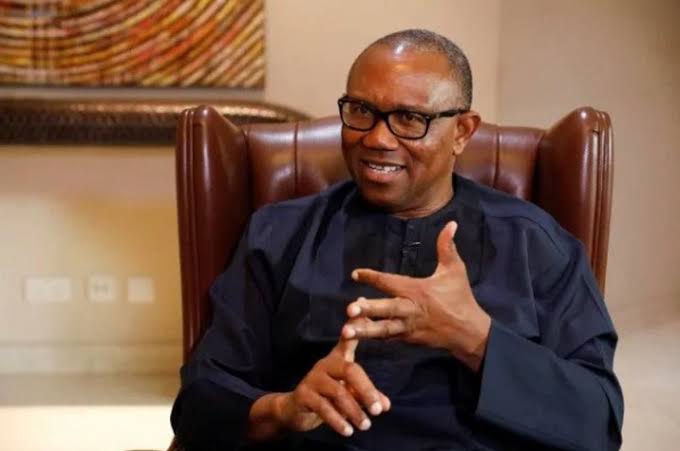News
400,000 policemen not enough to secure Nigeria’s – Kalu

…… Says State Police necessary for effective policing
By Chukwuka Kanu, Abuja
Speaker of the House of Representatives, Rt. Hon. Tajudeen Abbas has said that the number of policemen which is placed at about 400,000 is not sufficient to provide security to over 200 million Nigerians.
Speaking during a courtesy call on him by the association of Clerks of State Houses of Assembly on Thursday, Abbas who was represented by the Deputy Speaker of the House, Rt. Hon Benjamin Okezie Kalu, said that it became necessary to establish state police.
He said state policing will increase internal security because the operators are already familiar with the terrain they are to police.
Abbas said that the establishment of State Police is akin to the amendments made to issues of railway, power amongst others by the 9th National Assembly to enable the States enjoy some constitution rights under the concurrent list to delve into those issues.
He said: “On other key nationally important matters like state police, for example, the House recognizes the diverse perspectives and needs across different states. We believe that through constructive dialogue and a willingness to find common ground, we can arrive at solutions that truly serves the best interests of all Nigerians.
“Talking about state Police, you will remember also that we did something with the Correctional Services. These are issues that ordinarily fall into the exclusive list of the Constitution of the federal of republic of Nigeria which you had no business tampering with.
But in the spirit of true federalism, the 9th and 10th Assemblies are determined to bring some of these for better governance to take it from the exclusive list to the concurrent list. We did that with the railway and power in the 9th assembly. The question is, how many of the states have drafted laws, domesticating that in their state?
“Now, the State Police is here. We want to use the legislative intervention to improve the needs in our society. One of our needs is security. And we have tried the one layer police system and they overwhelmed us. The truth remains that 400, 000 policemen, policing over 200 million people can never give you the expected security. It is not even in line with the international best practices on police per citizen policing.
“How do we make it trickle down and achieve what we are looking for. Imagine a brother of mine trained in Sokoto or Kaduna during his training as a policeman and he finished and was sent to Bayelsa, a riverine area where the culture is different, language is different, even the way of movement is different -they use mainly boats and this our brother has a phobia for water, how do you expect him to police the people who swim?
The policing will not be thorough. But take a man from that community who knows the in and out of the geography of the area, train him around that place, send him to police, you will agree with me that he will police better. The same thing if you take my brother from Bayelsa to Sokoto, he will not police better than the Sokoto man.
“Yet, the spirit of one nation, national integration, federal character is key and cannot be tampered with. That is why the federal police can have the coloration of what it is at the moment.
“And another thing is, if we don’t streamline it, you will see pockets of organizations, vigilante groups springing up everyday, getting armed everyday. If tomorrow we are not able to manage them in line with the core principle of policing, we may end up creating monsters that will add to insecurity.”
Abbas also called for collaborations among the national parliament and the State Assemblies with regards to the ongoing constitutional amendments.
He said that the synergy was necessary if lofty results were to be achieved.
“The House of Representatives recognizes the crucial role State Assemblies play in shaping the fabric of our nation. We understand that effective governance in a federal system like ours requires inter-governmental collaboration and synergy between the government at the center and the federating units.
“The Nigerian constitutional amendment process has long been a subject of national discourse, and rightfully so because the society is dynamic. It presents a unique opportunity to address critical issues, strengthen our institutions, and pave the way for a more prosperous, enviable and equitable future for all Nigerians.
“However, this process cannot succeed without a unified front. It’s been tested time and again that the federal legislature in isolation of the states legislature cannot amend the grundnom. The constitution is clear on that. Responsibility is shared.
“The House of Representatives firmly believes that collaboration between the National Assembly and State Assemblies is essential to achieve meaningful and lasting reforms. The clerks are the backbones of the State legislature.
“We are committed to working closely with you, the Clerks who serve as the backbone of your respective legislative houses, to ensure open communication, exchange of ideas, and a shared understanding of the issues at stake”, he said.
Earlier in her presentation, the chairman and leadership of the delegation, Rukaiyatu Adamu Jalo told the Speaker that their mission to the House was to seek collaboration with the House, appreciate the national assembly for the passage of the autonomy for state legislature and judiciary bill into law and to understudy the national parliament on the implementation of practice and procedures of legislative business.
Bemoaning the non implementation of the act in many states, Adamu appealed to the House leadership to interface with the Forum of State Speakers to resolve the issue.
News
SAD! Professor’s son takes own life inside varsity staff quarters

Rilokwah Jatau, a 23-year-old student of Nasarawa State University, Keffi (NSUK), was found dead in an apparent suicide in the university’s senior staff quarters.
The discovery was made on April 27, 2025, by Emmanuel Gyawo, a security officer at the university, who was directed by Professor Shedrack Jatau to check on his son.
Upon arriving at the residence, Gyawo found Rilokwah hanging from the ceiling.
Professor Jatau, who was reportedly out of state at the time, was informed of the incident. A team of police detectives, led by the Divisional Crime Officer (DCO) of Angwan Lambu, was dispatched to the scene.
The body showed no signs of violence, and no suicide note was found. Rilokwah was rushed to the Federal Medical Centre (FMC) in Keffi, where he was confirmed dead by a medical doctor. His body has been deposited in the hospital morgue.
Police sources say investigations are ongoing to determine the circumstances surrounding the incident.
News
FG cancels scholarship programmes abroad

The Minister of Education, Dr Tunji Alausa, has announced the discontinuation of the Bilateral Education Agreement (BEA) scholarship programme.
Alausa made this known on Tuesday in Abuja during a courtesy visit by newly elected officials of the National Association of Nigerian Students (NANS).
He described the BEA programme as an inefficient use of public resources, noting that many of the courses pursued abroad under the scheme were readily available in Nigerian universities.
“I was asked to approve N650 million for 60 students going to Morocco under the BEA programme when I assumed office in 2024.
“I refused. It’s not fair to the majority of Nigerian students,” Alausa said.
The minister expressed dissatisfaction with the behaviour of some beneficiaries, who he claimed had resorted to “blackmail” on social media over delayed allowances.
The News Agency of Nigeria (NAN) reports that several BEA scholars had previously accused the Federal Government of abandoning them and failing to pay their entitlements.
However, the government recently clarified that all supplementary allowances had been paid up to December 2024.
Established through diplomatic partnerships, the BEA programme enabled Nigerian students to study in countries such as China, Russia, Algeria, Hungary, Morocco, Egypt, and Serbia.
Alausa said the government would now redirect BEA funds toward domestic scholarship schemes to benefit a larger number of students.
“I reviewed the courses, some students were sent to Algeria, a French-speaking country, to study English, Psychology, and Sociology, programmes we offer better here in Nigeria,” he said.
He criticised the lack of academic oversight, revealing that scholars received free annual travel without proper performance monitoring.
“In 2025 alone, the government planned to spend N9 billion on just 1,200 students.
“That’s unjust when millions of students in Nigeria receive no support. Every single course these students are studying abroad is available in Nigerian universities,” he said.
Alausa stressed that while current beneficiaries would be allowed to complete their programmes, the BEA scheme would not continue beyond 2025.
“We are cancelling the BEA. It is not the best use of public funds. The money will now be used to fund local scholarships and support more Nigerian students,” he said.
Earlier, the newly elected NANS President, Olushola Oladoja, commended the minister for reforms and progress achieved since assuming office. (NAN)
News
Obi doesn’t need political coalition to flush out Tinubu in 2027 – NLC declares

The Nigeria Labour Congress (NLC) has declared that Peter Obi, the Labour Party’s 2023 presidential candidate, can secure victory in the 2027 presidential election without forming alliances with the Peoples Democratic Party (PDP) or relying on figures like Atiku Abubakar or Nasir El-Rufai.
In an exclusive interview, Professor Theophilus Ndubuaku, Deputy President of the NLC Political Commission, described Obi as a credible, broadly accepted leader with deep grassroots and international support more than enough to unseat President Bola Tinubu, assuming a free and fair electoral process.
Ndubuaku dismissed speculation about Obi’s possible return to the PDP, labeling the party “crisis-ridden and practically empty.”
“Peter Obi is a sellable candidate. He doesn’t need any coalition to win in 2027,” Ndubuaku stated. “He was already in the lead during the 2023 elections, even clinching Lagos Tinubu’s stronghold which clearly demonstrates his nationwide appeal.”
He emphasized that transparent and credible elections by the Independent National Electoral Commission (INEC) would reveal the breadth of Obi’s support, which cuts across all six geopolitical zones.
His remarks follow the Obidients Movement’s recent reaffirmation of loyalty to Obi. National Coordinator Dr. Yunusa Tanko described Obi as the only candidate capable of bringing meaningful change to Nigeria.
Ndubuaku further criticized the PDP, arguing it no longer presents a viable platform for serious contenders. “The Labour Party has resolved its internal leadership disputes, unlike the PDP, which remains in disarray. Leaving LP for the PDP would be like jumping from the frying pan into the fire.”
He also downplayed zoning concerns, insisting Obi’s competence should take precedence over rotational politics.
“The North may worry he’ll seek two terms and upset zoning arrangements, but Obi is not power-hungry he is driven by a sincere commitment to national transformation,” he concluded.
-

 News20 hours ago
News20 hours agoJust in: Popular Nigerian billionaire, E-Money nabbed by EFCC
-

 News21 hours ago
News21 hours agoKing Sunny Ade’s family opens up over his whereabouts after daughter’s alarm
-

 Politics17 hours ago
Politics17 hours agoJust in: Ex- Gov Okowa accepts betraying Southern Nigeria, laments running with Atiku
-

 News21 hours ago
News21 hours agoEx-DIG,Olofu debunks online newspaper report, says ” I retired from NPF meritously after 35yrs service
-

 News17 hours ago
News17 hours agoBoko Haram Kill Mourners, Kidnap Others In Borno
-

 Metro4 hours ago
Metro4 hours agoGunmen storm University of Benin teaching hospital, kill doctor
-

 News5 hours ago
News5 hours agoJust in: FG declares tomorrow public holiday
-

 Metro5 hours ago
Metro5 hours agoFCTA destroys 601 motorbikes over violations






